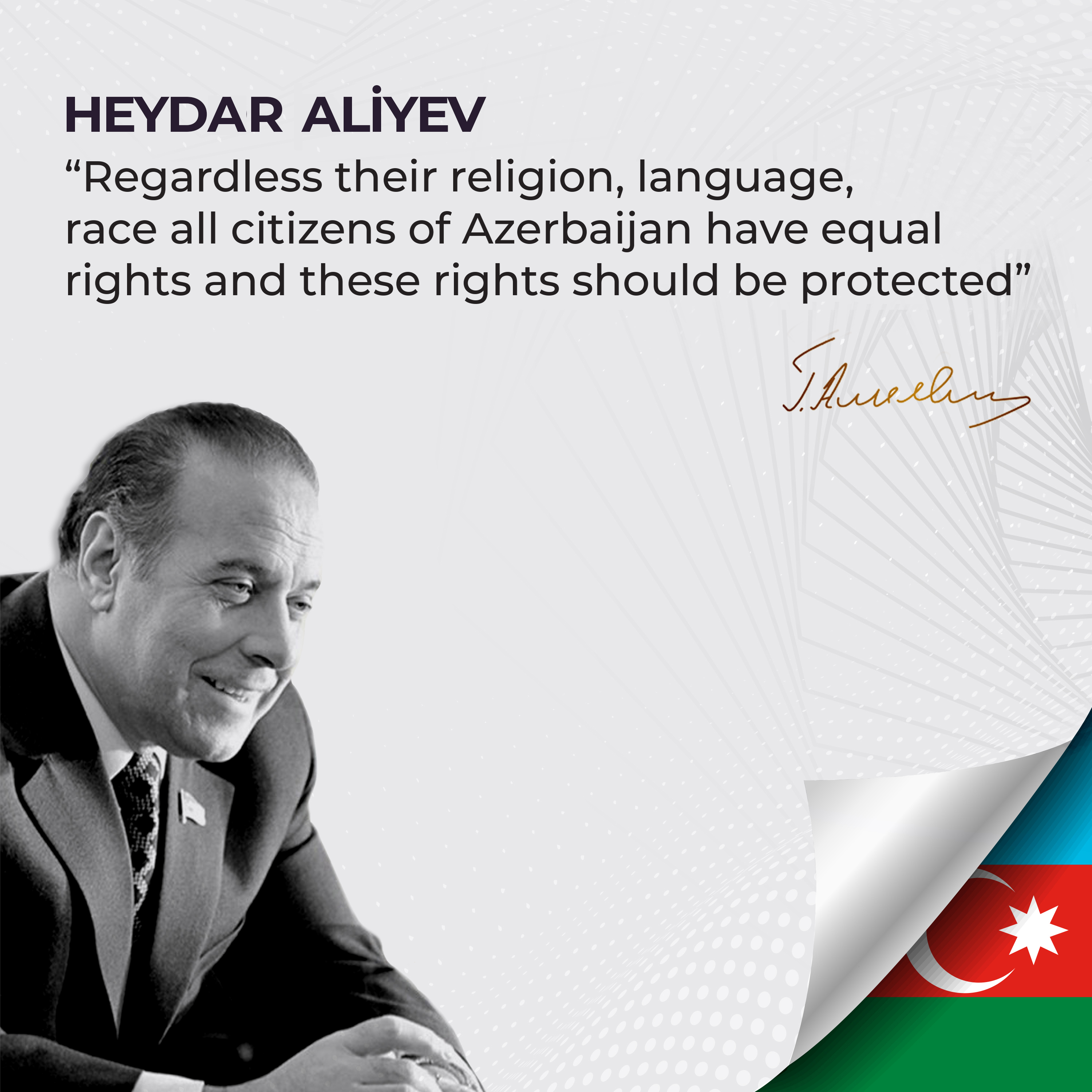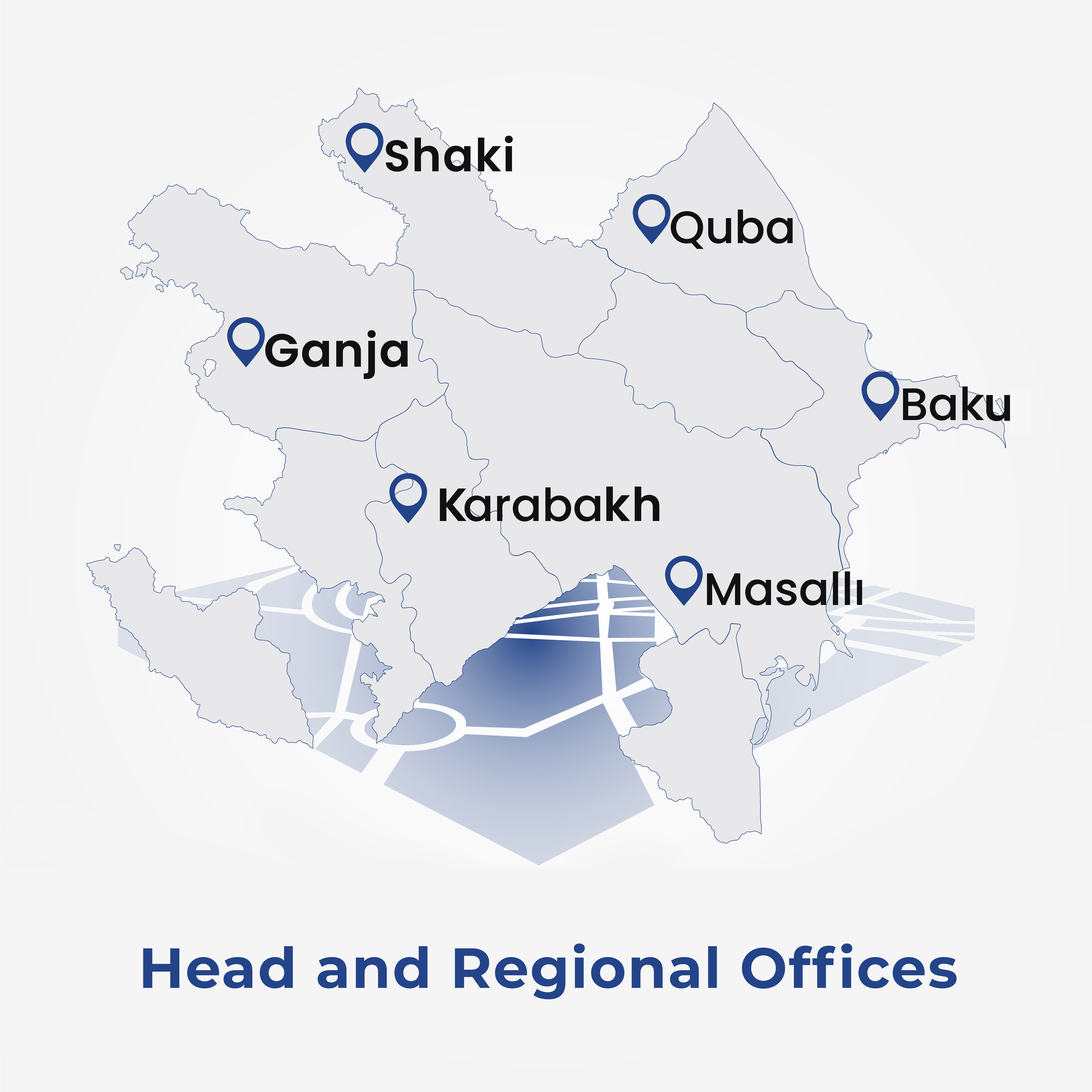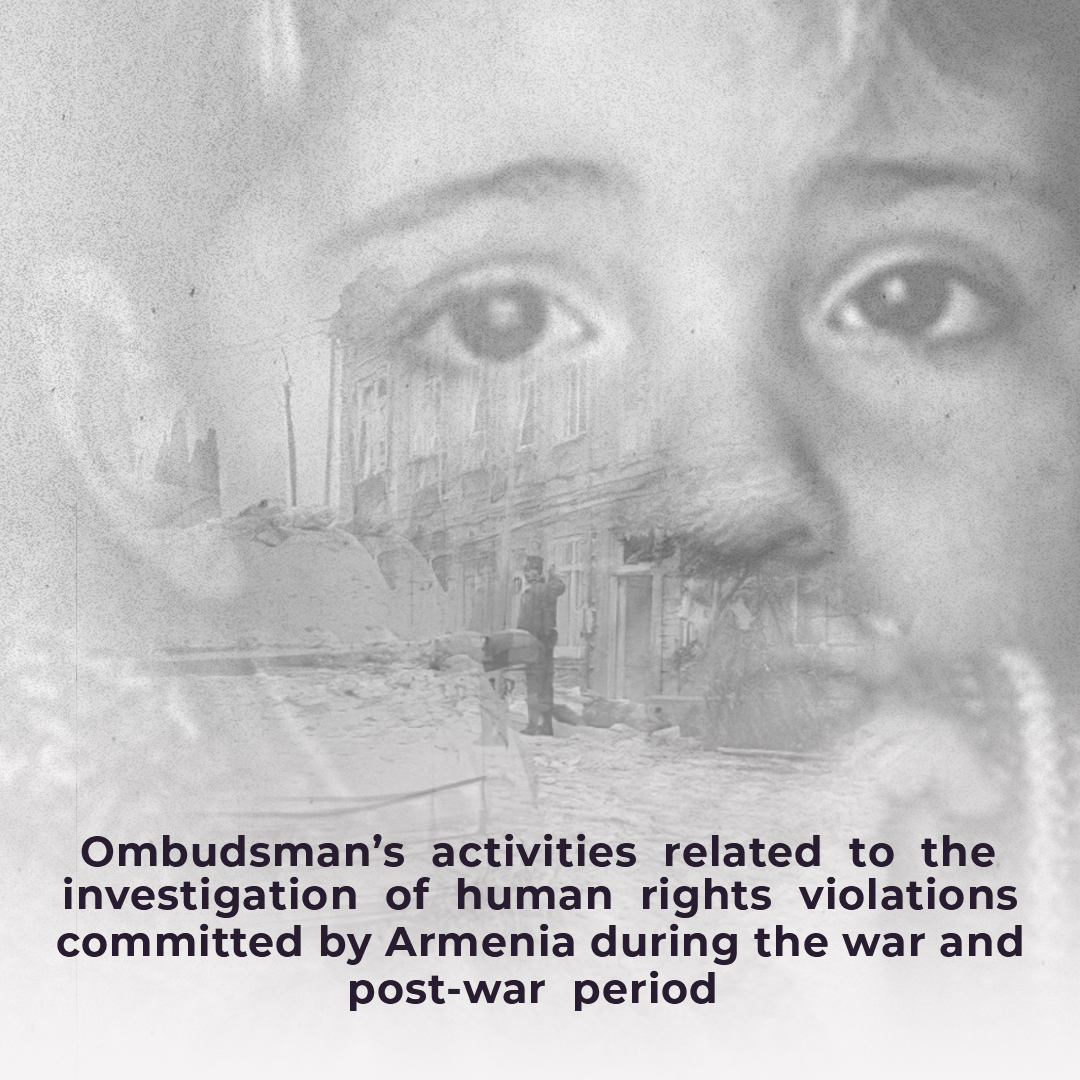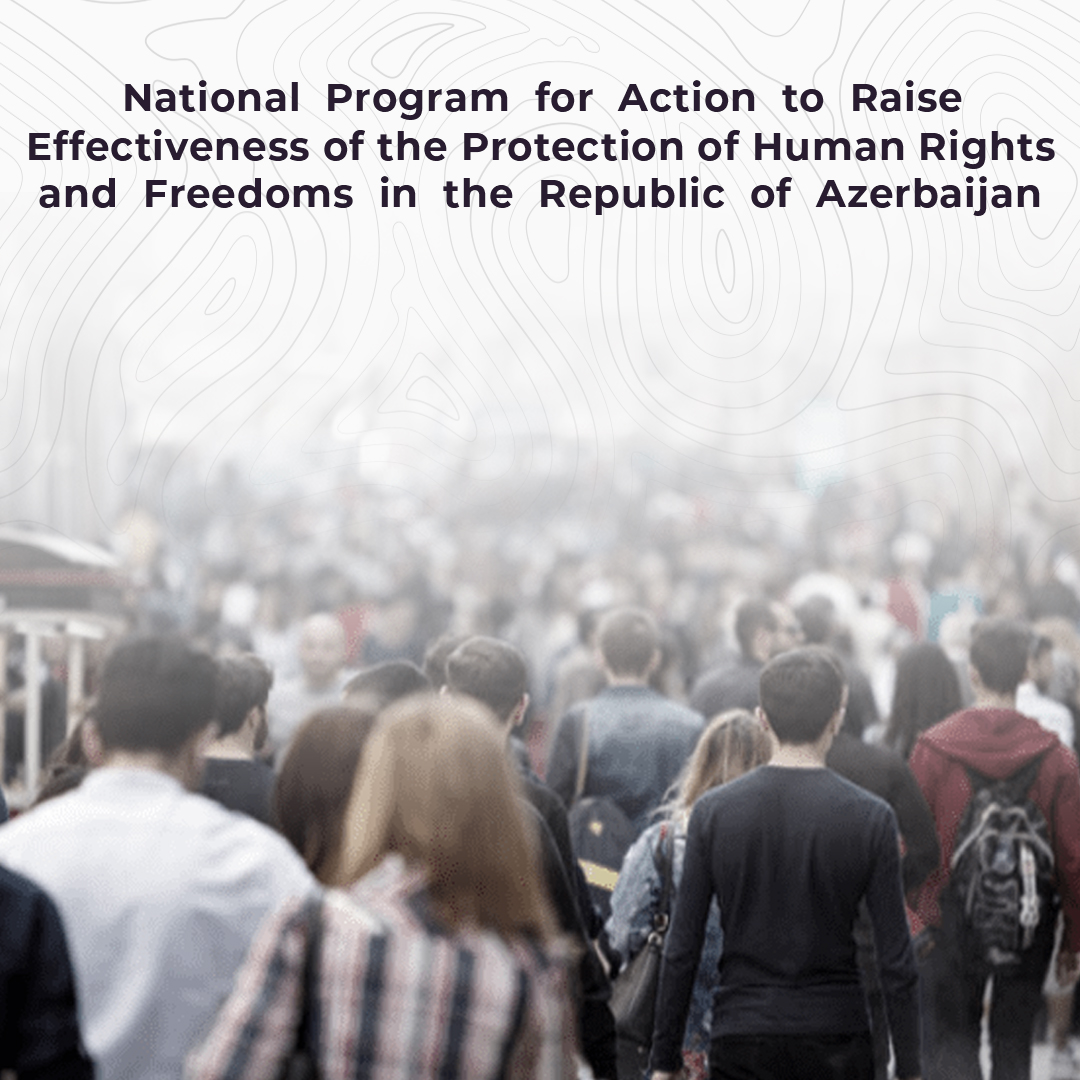
APPEAL by the Commissioner for Human Rights (Ombudsman) of the Republic of Azerbaijan in connection with September 21 - the International Day of Peace
21-09-2021
468 dəfə oxunub
The International Day of Peace was recognized on November 30, 1981, by the General Assembly of the United Nations. On September 28, 2001, in accordance with a unanimous resolution of the General Assembly, September 21 is marked around the world as the International Day of Peace.
Today, the establishment of peace in the world is also important in terms of achieving the UN Sustainable Development Goals, as it is one of the most pressing global problems in the current day, which stands as a prerequisite to human rights, as well as poses serious obstacles to the sustainable development of mankind. The theme of the International Day of Peace for 2021 is “Recovering Better for an Equitable and Sustainable World”.
Ensuring peace and security is one of the most important factors for the reliable protection of human rights and freedoms at the international and national levels. Today, peace in the world is a global challenge, and the protection of the sovereignty of states, the promotion of coexistence, the growing conflicts between countries, religions, and civilizations, the ongoing conflicts, and new hotbeds of war are direct obstacles to peace. Today, as a result of such armed conflicts and wars, millions of people, including, but not limited to, children, women, the elderly, and people with disabilities, are being expelled from their homes.
Unfortunately, we would like to note that Armenia’s long-term policy of aggression and ethnic cleansing against Azerbaijan and its population, which has been a constant obstacle to the peace process, is a threat and danger to stability and peace in the region.
UN Security Council Resolutions No. 822, 853, 874, and 884 of 1993 on the prevention and thwarting of Armenian military aggression, the restoration of Azerbaijan's territorial integrity within its internationally recognized borders, the return of refugees and internally displaced persons to their native homes, thereby ensuring lasting peace and security in the region, as well as the UN General Assembly Resolution on the Situation in the Occupied Territories of Azerbaijan of 14 March 2008, which provides for the withdrawal of Armenian forces from the occupied territories of Azerbaijan and the provisions contained in these documents, remained only on paper. Prolonged peace talks by international organizations mediating in the solution of the problem did not yield any significant results.
In this regard, the political and military leadership of Armenia is confident that it will not be subjected to any pressure at the international level and, through not being held accountable for its actions, thus continued to commit crimes against peace and humanity, including war crimes, terrorism, and the financing of terrorism.
Despite Azerbaijan's right to self-defense in accordance with Article 51 of the UN Charter, our state has always pursued a peaceful policy course, adhering to the well-known principles and norms of international law, patiently trying to recuperate its territorial integrity peacefully. However, despite all the efforts, Armenia has not given up its policy of aggression, veiled by double standards.
Unwilling to relinquish its territorial claims against Azerbaijan, the Armenian armed forces since September 27, 2020, have used prohibited weapons, including operational-tactical ballistic missile systems, to destroy units of the Azerbaijani armed forces, as well as deliberately targeted densely populated settlements far from the frontline. As a result, 94 civilians, including 12 children, were killed, 414 people were injured, including 50 children, and more than 3,410 houses, 120 apartment buildings, and 512 civilian infrastructures, including many schools, hospitals, and kindergartens, were destroyed.
All this has resulted in serious violation of the provisions of the international treaties on the protection of civilians - children, women, the elderly, persons with disabilities in times of conflict, including the Geneva Conventions for the Protection of War Victims of 12 August 1949 and their Additional Protocols, as well as the UN Declaration on the Protection of Women and Children in Emergencies and Armed Conflict, the Convention on the Rights of the Child and the Convention on the Rights of Persons with Disabilities.
As a result of ecological terror carried out by Armenia through the use of banned chemical weapons and deliberate mass fires, the environment in the Karabakh region of Azerbaijan, including freshwater sources, has been physically and chemically polluted, various rare plant and animal species were destroyed and the cessation of the process of self-regulation in rivers and lakes, which has turned the water basins into a dead zone, harmful to all living organisms. Thus, not only the nature of our country but also the flora and fauna of the region have been seriously damaged. This is a violation of international agreements on ecology and the environment to which Armenia is a party, including the UN Convention on the Prohibition of the Use of Military or Any Other Enemy Methods of Environmental Change.
In order to achieve the restoration of territorial integrity and the establishment of lasting peace and security in the region within the internationally recognized borders, Azerbaijan ensured alone the implementation of the above-mentioned resolutions by liberating the occupied territories from Armenia as a result of 44 days of successful counter-offensive operations, carried out from September 27 to November 10, 2020.
The conflict was almost over with the signing of a tripartite statement dated November 10, 2020, announcing the end of all military operations between Armenia and Azerbaijan. After the 44-day war, new opportunities have emerged in the South Caucasus to ensure lasting peace, which serves to normalize and develop interstate relations in accordance with the new realities, ultimately resolve the long-running conflict in the region and restore all economic and transport ties.
Adhering to its just peace policy and fulfillment of the obligations set forth in the trilateral declaration, the Azerbaijani side has repeatedly stated that it is interested in concluding a final peace agreement and establishing normal neighborly relations between the peoples of the two countries after the peaceful restoration of its internationally recognized borders and the respect for its territorial integrity from the Armenian side. However, the latter, unwilling to reconcile with the existing realities, refuses to comply with the terms of the tripartite statement and continues its military provocations and smear campaign against Azerbaijan.
We are witnessing statements by the Armenian political elite expressing ethnic intolerance towards Azerbaijan and its citizens, especially in the post-war period, when relations between the peoples and discussions on stable peace in the region are expected to thrive.
Guided by the principle of peaceful coexistence with neighboring countries and the development of regional cooperation, Azerbaijan puts forward concrete proposals to reduce tensions in relations with Armenia, strengthen regional peace and expand cooperation. However, ignoring these calls, Armenia continues to spread hatred, bigotry, and intolerance against Azerbaijanis in various media resources and social networks.
Cities, settlements, and villages in the liberated areas were almost completely destroyed by the Armenian armed forces, and hundreds of thousands of mines were buried in those areas. The presence of these mines, which have been active for decades and pose a serious risk, not only threatens the right to life, but also prevents the return of IDPs to these areas, and significantly slows down the recovery and development process in general.
After the end of the war, not only servicemen but also civilians were killed or wounded by landmines. The Armenian side, which refused to provide Azerbaijan with accurate maps of the mined areas during the occupation, poses a serious threat to human life and health, as well as hinders the implementation of state-important projects in the reconstruction of our liberated territories. In so doing, it violates the principle of distinction in international humanitarian law, the requirements of Additional Protocol I to the Geneva Conventions of 1949, and by openly declaring this, demonstrates open disrespect to the international community.
It has not yet been possible to obtain information from the adversary side about the fate of 3890 our compatriots registered as missing as a result of Armenia’s military aggression against Azerbaijan. It is of concern that the Armenian side, avoiding the initiatives for peace with different efforts, refuses to cooperate in the exchange of information about the fate and whereabouts of missing Azerbaijanis even after the end of the war.
Given the important role of just peace and mutual understanding in the effective implementation of obligations arising from the norms and principles of international law,
We call on international human rights organizations, world countries, foreign ombudsman institutions, and other national human rights institutions should make joint efforts to restore and protect violated human rights in the region, for Armenia’s observance of the norms and principles of international law and the establishment of lasting peace;
We urge Armenia to respect the internationally recognized territorial integrity of Azerbaijan, to refrain from provocative actions threatening the life and health of the civilian population, which are aimed at gross violations of fundamental human rights,
to put an end to the actions that impede the objective implementation of the delimitation and demarcation process and the conclusion of a final peace agreement, which is important for the political and economic development of the region, in order to clarify the state border between the parties;
to take urgent measures to provide objective information on the fate of those missing during the First and Second Karabakh Wars and to provide the Azerbaijani side with accurate maps of landmines in the liberated cities and regions;
to create conditions for the opening of important transport communications for the development of the region, including the construction of new transport and communication lines connecting the Nakhchivan Autonomous Republic and the western regions of Azerbaijan, for IDPs and refugees to return to their ancestral lands and live peacefully, and comply with all the terms of the tripartite statement of November 10, 2020.
Sabina Aliyeva
The Commissioner for Human Rights (Ombudsman)
of the Republic of Azerbaijan
September 21, 2021
The Appeal is addressed to the UN Secretary-General, UN Security Council, UN High Commissioner for Human Rights, UN High Commissioner for Refugees, UN Human Rights Council, UNICEF, UNESCO, European Union, Council of Europe, OSCE leaders, International and European Ombudsman Institutions, Asian Association of Ombudsmen, Organization of Islamic Cooperation and the Ombudsmen Association of its member states, Independent Permanent Commission on Human Rights of the Organization of Islamic Cooperation, European Network of Ombudsmen for Children, International Peace Bureau, Universal Peace Federation, ombudsmen and national human rights institutions of different countries, embassies of the Republic of Azerbaijan in foreign countries and foreign countries in our republic, Azerbaijani diaspora organizations.
- .
-

- The Ombudsman participated in the International Conference on “Artificial Intelligence and Human Rights: Opportunities, Risks and Visions for a Better Future” in Qatar.
-

- The Ombudsman sent letter to UN High Commissioner for Refugees regarding protection of rights of persons deported from Armenia.
-

- A representative of the Ombudsman Office took part in an event organized by the Ministry of Energy.
-

- The Ombudsman’s representatives participated in the Pardon Decree Enforcement Ceremony.
-

- A series of legal awareness events were organized by the Ombudsman's Regional Centers.
-




